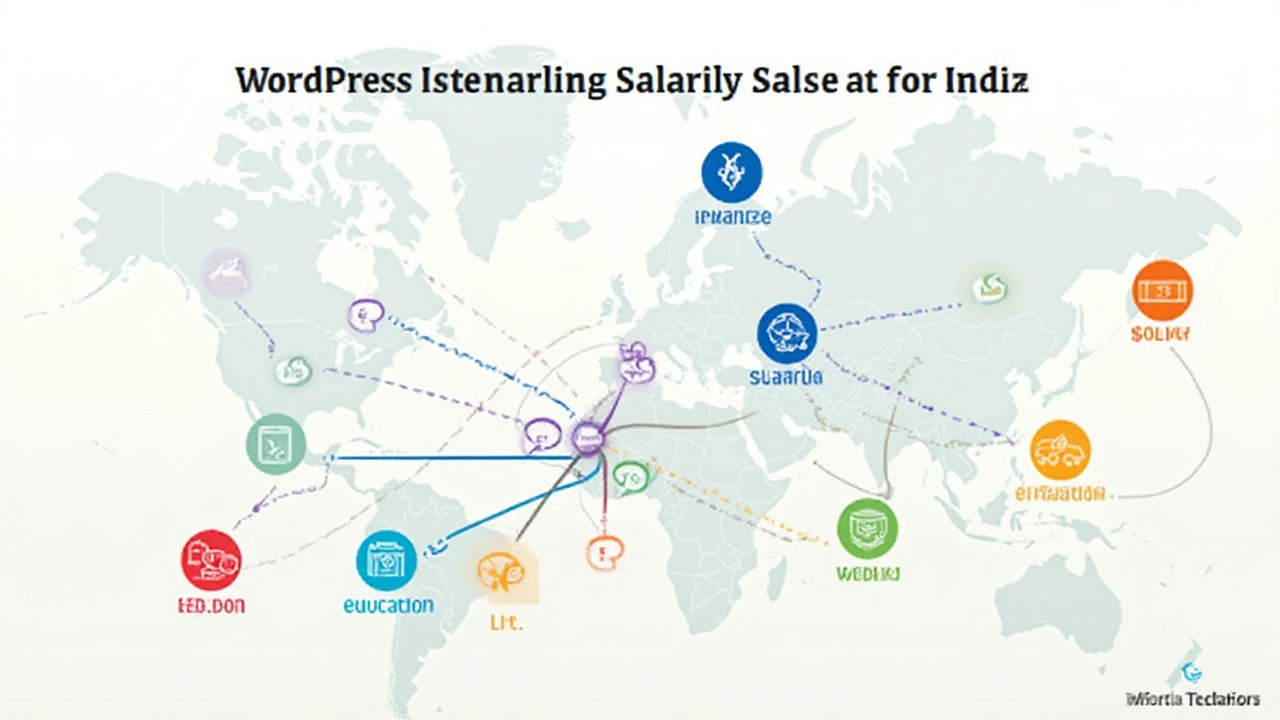In the digital age, WordPress developers are in high demand, and their salaries are an intriguing topic for many. As a WordPress developer, you weave together the front-end and back-end of websites, ensuring they run smoothly and look great. But what do these skilled artisans of the web earn?
Several factors play into the salary of a WordPress developer. Your location, level of experience, and specific skills can all influence how much you bring home at the end of the day. Additionally, the industry you choose to work in can also affect earnings. Understanding these variables can help both new and seasoned developers navigate their career paths effectively.
In this article, we'll dive into the world of WordPress developer salaries, uncovering what you might expect in various situations. Whether you're just starting out or looking to climb higher in your career, these insights are designed to equip you with the knowledge to maximize your earning potential.
- Understanding the Role of a WordPress Developer
- Factors Influencing WordPress Developer Salaries
- Average Salary Ranges by Geographic Location
- Salary Variations Across Different Industries
- Tips for Negotiating a Higher WordPress Developer Salary
Understanding the Role of a WordPress Developer
Grasping the nuances of a WordPress developer role begins with recognizing the multifaceted nature of web development itself. A WordPress developer is not just about writing code - it's about crafting seamless user experiences and driving business goals through a highly adaptable content management system. At its core, a WordPress developer balances the art of web design with the science of programming, often requiring them to adeptly handle HTML, CSS, JavaScript, and PHP. The task of ensuring responsive design, optimizing for search engines, and guaranteeing cross-browser compatibility is pivotal to their daily checklist.
A pivotal aspect of the WordPress developer’s job involves the creation and customization of themes and plugins. Themes dictate the overall appearance and user interface, while plugins extend website functionality. This understanding is crucial for developers in catering to client requirements or personal projects. Customization and building from scratch are part and parcel of their routine, requiring creativity and precision. Developers often engage with clients to assess existing websites and identify potential areas for improvement, which may range from increasing loading speed to enhancing security protocols.
According to W3Techs, WordPress powers over 40% of websites globally, a testament to its popularity and functionality. This also translates into a wide range of job opportunities for WordPress developers across diverse industries, from e-commerce to media companies. A seasoned developer is expected to stay up-to-date with the latest trends and updates in the WordPress ecosystem, as staying informed is key to maintaining a competitive edge. A well-rounded developer is one who not only understands the technical aspects but also appreciates the broader business objectives, integrating web solutions that genuinely enhance user experience and revenue potential.
"Working with WordPress is like gardening; it requires patience, understanding, and a keen eye for details." - Matt Mullenweg, co-founder of WordPress.
Developers frequently find themselves in collaborative environments, working alongside designers, content creators, and project managers. Communication skills are thus as necessary as the technical ones. They are tasked with translating abstract ideas into functional web entities, making technical jargon understandable to non-tech-savvy clients. This requires patience and a knack for storytelling, helping clients visualize how their ideas will manifest in the digital realm. Emphasizing strong written and verbal communication is just as significant as technical prowess. A WordPress developer's role goes beyond technicalities; it embodies a blend of creativity, business acumen, and people skills.
Factors Influencing WordPress Developer Salaries
The salary of a WordPress developer can be as varied as the weather—shaped by a plethora of factors that may surprise even those within the industry. Experience, naturally, comes to the forefront. A seasoned developer with five or more years under their belt can command significantly more than someone fresh out of coding bootcamp. This isn't just about the amount of code one can churn out, but the depth of understanding and intricate problem-solving skills honed over years of crafting robust websites.
Another notable factor is location. In larger tech hubs like San Francisco or London, where the cost of living is notoriously high, salaries tend to reflect these living conditions. A junior developer might still fetch a hefty sum, whereas, in smaller towns or cities, compensation tends to be lower. This variance is not merely geographical but economic, as these cities often host larger corporations willing to pay premium prices for talent.
But it’s not just about where you are; it’s also about what you know. Specializations can significantly affect a WordPress developer's salary. Those proficient in developing customized plugins, themes, or possess expertise in e-commerce platforms like WooCommerce often find themselves better compensated. Moreover, those with knowledge of enhancing site performance, security, and core architecture improvements are particularly sought after. As one seasoned pro once said, "In WordPress development, mastering a niche could very well be your golden ticket."
We must also consider the industry. A developer working for a startup might face different salary negotiations compared to one employed within a multinational corporation. While startups may offer the allure of stock options and a fast-paced environment, larger companies often provide stability and substantial benefits packages alongside competitive salaries. Here's an interesting note: tech giants often set industry benchmarks for salaries, pulling the average up, even indirectly influencing smaller companies.
Finally, the economy’s health plays a silent, yet potent role. During economic booms, investments in digital presence grow, amplifying demand for web development. Conversely, during downturns, the tightening of financial belts can put pressure on salaries. Yet, WordPress developers often enjoy a degree of security; businesses still require a robust online presence to stay afloat.
To sum up this section, understanding these factors is essential for any WordPress developer looking to navigate salary negotiations or career advancements. Whether considering geographical relocation, expanding skillsets, or pivoting industries, these insights serve as vital tools in crafting your own professional path.

Average Salary Ranges by Geographic Location
When it comes to the salary of a WordPress developer, geography can significantly influence what numbers appear on your paycheck. In the vibrant realm of web development, location becomes a major player not just for the cost of living differences, but also for the tech-driven economies of respective regions. Let’s explore how the pay scale unfolds across various corners of the globe.
In the United States, the demand for skilled WordPress developers is quite high, particularly in tech hubs like San Francisco and New York. These areas typically offer higher salaries to match the elevated cost of living. Recent data suggests that in these major cities, a developer's salary can range from $70,000 to over $120,000 per year. Across the Atlantic, the United Kingdom also offers lucrative salaries, especially in London where the range tends to hover between £40,000 and £70,000 annually.
On the other hand, developers based in countries with rapidly growing tech sectors, such as India or the Philippines, may observe a different scenario. The salaries here are influenced by a combination of high demand and a global outsourcing trend, where companies seek cost-effective solutions for their development needs. In India, a WordPress developer might expect to earn between ₹300,000 and ₹1,200,000 per year, which aligns with the local economy and job market dynamics.
Interestingly, remote work has added a new dynamic to salary structures. Developers residing in countries with traditionally lower pay scales can now compete in the international market, often securing salaries reflective of their skills and project contributions rather than their physical location. This shift allows talented developers from all over the world to tap into opportunities previously unavailable in their local economies.
Ian Hathway, a respected analyst in tech employment trends, notes, "Remote work is leveling the playing field in tech salaries, offering developers the opportunity to fetch competitive wages irrespective of their geographic base."
Besides geography, the economic status and digital landscape of a country play significant roles. In countries like Germany and the Netherlands, where digital innovation is prioritized, WordPress developers enjoy competitive salaries that can range around €45,000 to €80,000 annually. As companies increasingly acknowledge the importance of quality web presence, those skilled in WordPress are finding their roles indispensable.
The dispersion of salary ranges across different locations points to an interesting reality of the modern workforce. While location continues to be a factor, globalization, and digital connectivity are steadily reshaping how location impacts earning potential. For developers considering relocation or remote work, understanding these nuances can be a strategic advantage in seeking the right opportunities for growth and financial stability.
Salary Variations Across Different Industries
When discussing the salaries of WordPress developers, it's intriguing to see how figures differ depending on the industry they choose to dive into. The landscape of web development is vast, and WordPress developers often find themselves navigating diverse sectors ranging from tech startups to major corporations and even non-profits. This diversity in employment can profoundly influence one’s salary.
- Tech Industry: Known for innovation and competitive compensation, the tech world often offers significant rewards for skilled developers. Here, WordPress developers are crucial for UI/UX, crafting seamless and functional digital experiences. In this sector, developers can expect lofty salaries and benefits that keep pace with the fast-paced nature of the industry.
"Tech companies value efficiency and creativity, making WordPress developers indispensable for maintaining cutting-edge websites," says tech entrepreneur Alex Wang, from a leading digital agency.
Moving beyond tech hubs, let’s explore industries like media and publishing, where the demand for content management is high. WordPress developers here have roles in deploying and maintaining content-rich platforms. Working in media can be less financially rewarding compared to tech yet offers ample opportunities for creativity and storytelling through digital design.
- E-commerce: With the rise of online shopping, e-commerce has become a massive playground for WordPress developers. Crafting, maintaining, and optimizing shopping platforms require vigilance and constant upgrades. Here, the salaries can be quite competitive, reflecting the critical nature of consumer-ready websites in a business’s success.
Corporate enterprises such as finance or healthcare also hire WordPress developers, though these positions might focus more on compliance and security of content rather than user-facing features. Salaries in these industries can range widely but often provide stability and benefits that are highly valued by many professionals.
- Non-profit Organizations: These organizations, though usually not as lucrative as corporate counterparts, can offer fulfilling work with competitive remuneration. Developers in this arena can enjoy unique challenges like building platforms for fundraising and community engagement.
| Industry | Average Salary (per year) |
|---|---|
| Tech | $90,000 - $120,000 |
| Media | $60,000 - $80,000 |
| E-commerce | $70,000 - $100,000 |
| Finance | $85,000 - $110,000 |
| Non-profit | $50,000 - $70,000 |
As we observe these variations, it’s clear that a WordPress developer's salary is not solely determined by skill or experience. The choice of industry influences financial prospects significantly, offering diverse opportunities and potential pathways based on one's preferences and professional goals. Whether you're drawn to the fast-paced tech giants or the heartfelt mission of a non-profit, there's a place—and a paycheck—waiting for talented developers wherever they wish to leave their mark.

Tips for Negotiating a Higher WordPress Developer Salary
Whether you're a seasoned WordPress developer or just entering the world of web development, understanding how to negotiate a higher salary is crucial. You should approach salary discussions with confidence and preparation to ensure you get what you're worth. Begin by researching industry trends to gauge the average compensation at your experience level. Websites such as Glassdoor and Payscale provide valuable insights into salary ranges for WordPress developers in different regions. Armed with this knowledge, you'll have a solid foundation to negotiate from, allowing you to set realistic expectations.
Enhancing your skill set is another powerful way to increase your salary. For instance, mastering premium WordPress plugin development or gaining expertise in popular frameworks like React or Vue.js can significantly enhance your value. Employers often look for developers who can bring more to the table than just basic knowledge. Showcasing a portfolio with diverse projects will demonstrate your capability to potential employers. It's not just about technical skills; your ability to problem-solve, communicate, and collaborate effectively plays a significant role in your earning potential.
"The art of negotiation is finding common ground without losing sight of your value," says career coach Abigail Thomas. "Knowing your worth means knowing what you bring to the company beyond just the code you write."
During the negotiation process, timing can be pivotal. The best time to ask for a raise is during your performance review or after you've completed a successful project that greatly benefited the company. When you’re preparing your pitch, be ready to articulate how you've contributed to the team's goals and growth. Highlighting metrics, such as increased website traffic or improved user engagement, can provide tangible evidence of your impact.
Strategies for Effective Communication
Good communication skills are key when negotiating your salary. It’s important to frame your discussion positively, focusing on how your skills and contributions warrant a higher rate of pay. Avoid ultimatums or comparisons with colleagues, as these can lead to a negative outcome. Instead, express appreciation for the opportunities you've had and emphasize your enthusiasm for continuing to deliver valuable work for the company. Approach the conversation as a dialogue rather than a demand, and be open to compromise if required.
Finally, don’t underestimate the power of benefits beyond the paycheck. While negotiating, consider perks such as flexible working hours, remote work options, or education reimbursement. These can enhance your overall job satisfaction and work-life balance without necessarily increasing your base salary. Remember, a successful negotiation isn't just about securing more pay; it's about finding a harmonious balance that furthers your career goals while aligning with your personal priorities.



